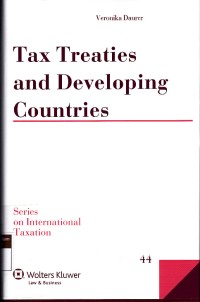
Book
Tax Treaties and Developing Countries
Countries eliminate the burden of double taxation for their taxpayers who engage in cross-border business activities by negotiating tax treaties with other countries. In the case of developing countries, tax treaties are often entered into with the additional purpose of attracting foreign investment as a path towards development. It is not clear, however, what role such agreements play in a country's development efforts. This thoroughly researched book is the first to tackle this important issue in depth. Through an analysis of the tax treaty provisions of eleven East African nations, the author unveils the actual impact of the UN Model on the tax treaty network of the countries analysed as well as the "real-world" relationship between tax treaties and development. All the crucial components necessary for understanding this relationship are examined, including the following: ;
• How the UN Model (designed for developing countries) deviates from the OECD Model;
• To what extent developing countries actually make use of the UN Model during treaty negotiations;
• The various functions of tax treaties, including elimination of double taxation, allocation of taxing rights, prevention of tax avoidance and fiscal evasion, and promotion of investment activities;
• The question of how source and residence taxation can be justified and which of these two concepts should be given preference;
• Exchange of information issues;
• The problem of tax havens;
• The concept of transfer pricing;
• The concept of permanent establishment;
• Patterns discerned in the treaty policy of developing countries and recurring non-model provisions;
• Treatment of business profits, royalties, and capital gains;
• Interest exemptions;
• Technical and administrative fees and treatment of pensions and annuities.
This book underscores the importance of tax treaties for developing countries. Its contribution to our understanding of both development and international taxation, and their reciprocal relationship, cannot be overemphasized. Further, it proposes modifications to the UN Model and its Commentary and suggests wording for additional provisions reflecting the tax treaty policy of the countries analysed in the book. The book will thus prove of immeasurable value to practitioners, academics, and policymakers in these disciplines.
Detail Information
| Call Number |
17 TAX ver
|
|---|---|
| Publisher | Wolters kluwer : Alphen aan den rijn., 2014 |
| Collation |
xx,341p.; 25cm
|
| Language |
English
|
| Classification |
17 TAX ver
|
| ISBN/ISSN |
9789041149824
|
| Edition |
Series on International Taxation
|
| Subject(s) |
-
|






